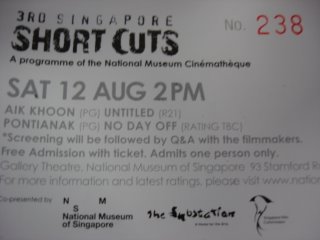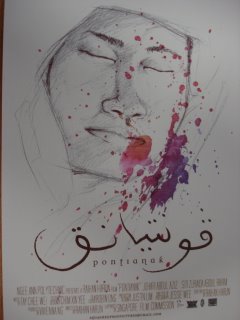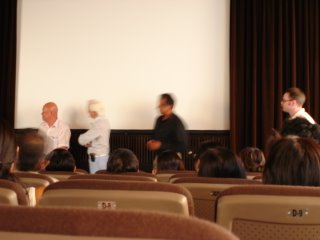
It was an almost full house today at the 4th and final week of the 3rd Singapore Short Cuts, and 3 additional rows of seats were added to the front of the hall to accomodate the expected spike in attendance, given that the highly rated, and much talked about (in the mainstream press the past few days, I counted 2 articles) about Eric Khoo's latest short film, No Day Off.
Aik Khoon - Chen Bang Jun
I was half suspecting it would be supernatural, given that I've never seen or heard a cab driver bringing a friend along during his shift, and having the front seat occupied. Aik Khoon tells the story of a cab driver and his good friend, and key to the movie is the bantering amongst the two.
Yet another "taxi driver" short (there was another one called The Passenger two weeks ago), this one didn't mind to be politically incorrect, and there was one moment where the cab driver lashed out, vocally and punctuated with a quick job of the middle finger, at women drivers :P
Untitled - Loo Zi Han, Kan Lume
If I'm smart then I'll run away
But I'm not so I guess I'll stay
Heaven forbid
I'll take my chance on a beautiful stranger - Beautiful Stranger, Madonna
There was no dialogue in this short, save for a music number played inside a car from Madonna's Beautiful Stranger. A take on regret after the lead had a quick tryst with a stranger of the same gender. The only short in this year's selection to be rated R21, this was made during the Singapore History Museum's Take 5! Soul to Soul, Guerilla Filmmaking Challenge in 2005.
Pontianak - Raihan Harun

Probably the only one with a poster-on-a-postcard, it's quite surprising to discover that Pontianak is a student-led effort. It had this all round creepy feel to it, and I had actually expected more shock-and-awe tactics to be used. However, it was more restrained rather than presenting an in-your-face all out horror movie with the usual cliches, though there is this use of a demonic kid, ever so popular these days.
Beginning with a funeral, the elements of Pontianak is adequately included here, like the nails, the banana tree, though what was I would have dug into was the actual appearance of the lady-in-white-with-fangs herself :P
No Day Off - Eric Khoo
The best of the selection today, and save that I didn't manage to watch the selections from the first week, I'd dare say this probably might triumph over the those as well. Obviously the highlight and the attraction which accounted for the large crowd turnout, No Day Off is actually produced as part of the Jeonju Intenational Film Festival's Digital Short Films by Three Filmmakers project, in which Eric Khoo is one of the three mentioned.
Co-written with his Be With Me collaborator Wong Kim Hoh, No Day Off heralds Eric's return to the short film genre after a series of acclaimed feature films, and probably stamped his class above the rest with this short, also the longest amongst the selection during this festival, but it never bores nor make you feel conscious about its duration (of almost 40 minutes).
Telling the fictionalized story of an Indonesian maid, Siti from Sulawesi, Indonesia, we learn of her reasons to want to become a domestic helper in Singapore, and chart her progress starting with the painful goodbyes, her training in Batam, and finally her assignments here. It recounts the harsh conditions of their work environment, from the poor wages, the language barrier, the high expectations, to the emotional and verbal abuses they have to quietly suffer.
When watching this short, I'm sure those in the audience who have domestic help, will look hard into themselves, and I hope they start to question if they are almost, as equally or heaven forbid, nastier than Siti's employers. There were 3 households presented, and I'd guess it would be easy for someone to identify which one closely resembled theirs.
There was someone in the audience sitting behind me quietly sobbing away during key, touching scenes, and later on I discovered that she is a real domestic worker. Guess while the movie have hit an emotional chord within us, it sure did resonate inside her even more.
This time round I didn't manage to capture any pictures of the Q&A Session, given I was seated near the front and had this huge head right in front of me :P Nonetheless, this is transcribed as best as I could (I think my worst effort so far, since there were a number of gaps as you'll see), any inaccuracies are my fault alone. And I guess it's bloody high time I get myself a digital voice recorder.
Seated LtoR (not that it matters): Wong Kim Hoh, Eric Khoo, Wenjie, Chen Bang Jun, Loo Zi Han, Raihan Harun, Kristine
First, the introduction of their shorts
A (Pontianak): The catalyst was my childhood experience on the occult. Someone close was very ill, and he had travelled to Malaysia and Indonesia to look for medicine men / bomohs, and had seen many strange stuff.
A (Untitled): This was done as part of Singapore History Museum's Guerilla Filmmaking Challenge, and was made in 36 hours.
A (No Day Off, EK): This was part of the Jeonju Intenational Film Festival's Digital Short Films by Three Filmmakers project, and I haven't done a short film for many years. It was based on articles in the news about maid abuse. Maids have become part of our lives, and it's an examination into why we can't treat them right.
A (No Day Off, WKH): It's a lot of sacrifice from the maids to come to Singapore to work, and there are many things which Singaporeans take for granted given our new found affluence.
Then there was this question which beat around the bush... something along the lines of the shorts being rooted to reality or just plain fictional
A (No Day Off, WKH): Movies are a reflection of real life. We are a small country, and when we make movies, we do so with minimal resources. The way to go for us is to make films or tell stories which resonate, and to see humanity up there on the screen.
A (Aik Khoon): There are no boundaries in film making, so it doesn't matter if it's based on reality or pure imagination. It doesn't have to be real, but it must have real heart.
A (Untitled): We have to come to an emotional place from within, we have to be true to the film, and true to yourself.
A (Pontianak): It depends on the themes you are trying to explore.
And there was a branch off into Mulholland Drive, and Eric Khoo mentioned something about his challenge to Royston Tan, to do something personal, yet commercial.
Q: What is the panel's perception of change in the last few years - whether it's easier to create, fund, and find places where their works can be screened?
A (Untitled): I haven't been around in the last 2 years, and this is my first narrative film.
A (Wenjie): From a film programmer's point of view, there are more venues around now to show films. While the number of venues have increased, it is now up to filmmakers to make more films to be screened.
A (No Day Off, WKH): Everyone's curating films, which can be good as we get exposed to variety. As for funding, people are reluctant to fund Singapore films, but there are grants which makes it a little bit easier. Singaporeans are a bit strange, in that we seem to need foreign endorsement (from overseas festivals etc) before we readily accept a local film, or think it is any good, and there is a need to change this mindset.
A (Pontianak): There have been some progress, but it is not enough. I recall a conversation that went
"So what do you work as" - "A filmmaker" - "No, really".
It's not really a viable thing to be a filmmaker in a society that we have now. It's still a romantic notion to work with DV, but the challenge is to make something to show it to the world.
Then there was a question about the support given by Mediacorp - Bang Jun mentioned that there was the Arts Central Channel at Mediacorp, and Raihan highlighted about television's unhealthy fascination with reality programmes. Zi Han added that we cannot rely solely on statutory boards of the government for funds, and Eric Khoo quipped that he doesn't understand what's on television these days, though he had seen Ezann Lee (who was in his film Be With Me) jumping around like an idiot in one of the local sitcoms (to plenty of laughter in the audience).
Q (No Day Off): How conscious were you in portraying Siti as a victim?
A (EK): It was pretty intentional, though we didn't' want to go into brutalities like burning with an iron. There are three different environments, and the last one was the most compassionate. It was also deliberate not to show the people she works for, so that the audience can ask "Shit, am I that bastard?"
A (WKH): We were quite mindful, and tried to make things as realistic as possible. The first family, very rich, but not exactly that bad, though they talk to her and about her like she's an invisible entity. You don't really see the abuse, but there are plenty of insensitivities like you're talking about a person who is without feelings. And we want to examine why is this attitude peculiar in a country like Singapore.
And Braema Mathi, president of Transcient Workers Count 2, made a comment that she was glad that there was no focus on physical abuse, but rather the focus was on the maid's quiet indignities, as this issue was harder to grapple with. She felt Siti was empowered, to have made the decision to leave her family and make that journey to be trained as a maid, in having the adaptibility to work in different homes she's put in, while at the same time, finding her own space.
A Panel Discussion on Short Filmmaking in Singapore - Evolution or Involution, started at 4pm right after the Q&A session, and lasted 2 hours. On the panel were producer Juan Foo, filmmaker Tan Pin Pin, Yuni Hadi from Objectifs, and moderated by Ben Slater. A whole range of issues were discussed, including inputs from filmmakers Woo Yen Yen and Colin Goh, who were in the 40 (approximate) strong audience.




























